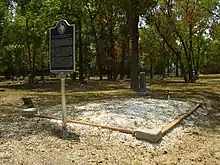Jack Yates
John Henry "Jack" Yates (July 11, 1828 – December 22, 1897) was a freedman, minister, and community leader in Houston, Texas.[1]
Jack Yates | |
|---|---|
| Born | John Henry Yates July 11, 1828 |
| Died | December 22, 1897 (aged 69) Houston, Texas |
| Nationality | American |
| Occupation | Minister |
| Known for | Antioch Baptist Church, Houston |
Notable work | Jack Yates House (Sam Houston Park, Houston) |
Early life
Yates was born on July 11, 1828 in Gloucester County, Virginia to Robert and Rachel Yates, two enslaved persons. Yates learned how to read despite proscriptions against it for enslaved persons.[1]
Career

In June 1865, Yates moved to Houston, where he worked hauling freight. He was ordained as a Baptist minister and was the founding pastor of the Antioch Missionary Baptist Church.[1]
Yates later purchased an area in the Freedmen's Town area of the Fourth Ward. Yates became the pastor of Antioch Missionary Baptist Church, in 1868.[2] The church was Houston's first African-American Baptist church. Yates established Houston Academy, a school for African-American children.[1]
Antioch Missionary Baptist Church helped to purchase land for Emancipation Park in Houston while Yates was the pastor. Yates left the church and founded Bethel Baptist Church in 1891.[1] He founded College Park Cemetery, which facilitated the burials of freed-persons and other African Americans.[3]
Personal life
Yates married Harriett Willis, who was forcibly moved when her master relocated to Texas. Yates was able to follow his wife to Texas, and they moved to Houston after emancipation. The couple had eleven children. Yates had a twelfth child during his marriage with Annie Freeman.[1]
Death and legacy

Yates died on December 22, 1897. Yates High School in Houston was named in his honor. He was first buried at Olivewood Cemetery, but later reinterred at College Park Cemetery.[1]
The 1870 Jack Yates House is located at Sam Houston Park in Downtown Houston and it was opened to the public on Wednesday December 11, 1996. Yates built and designed this house himself.[4]
References
- McCullough, Olee Yates (August 2, 2017). "YATES, JOHN HENRY". Handbook of Texas Online. Texas State Historical Association. Retrieved July 23, 2018.
- Snyder, Mike. "With its rich history, Fourth Ward is strong in symbolism." Houston Chronicle. Sunday January 9, 2000. A24. Retrieved on July 28, 2012.
- Aulbach, Louis F. (2012). Buffalo Bayou: An echo of Houston's wilderness beginnings. Houston: Louis F. Aulbach.
- Staff. "Yates House now open." Houston Chronicle. Wednesday May 11, 1996. A30. Retrieved on July 1, 2011. Archived October 21, 2012, at the Wayback Machine
Further reading
- Yates, Rutherford B. H. and Paul L. Yates. The Life and Effort of Jack Yates. Texas Southern University Press, 1985.
